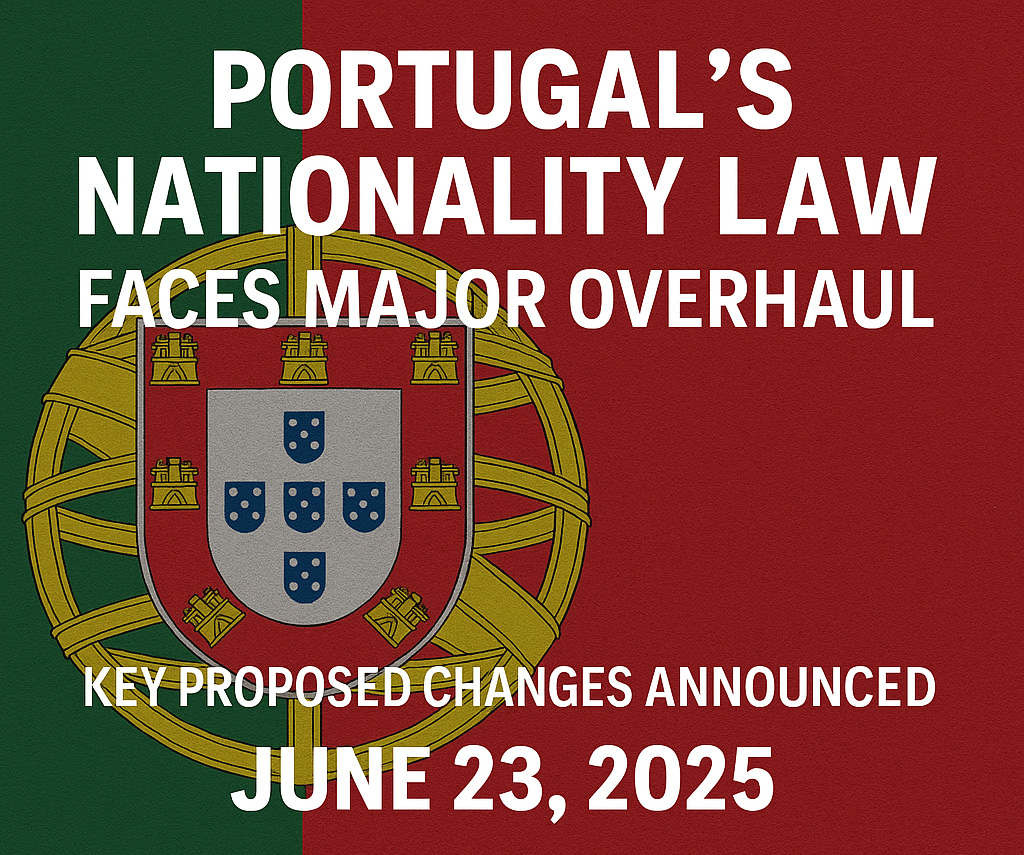
On June 23, 2025, the Portuguese government presented a set of major proposed changes to its nationality law. While headlines may sound dramatic, most current and future residents in Portugal will not be impacted by these proposals — especially those who hold or are applying for D7, D8, D2, and similar residence visas. These visas will continue to operate under existing rules, and access to residency remains unchanged.
That said, the proposals represent a significant tightening of pathways to citizenship and family reunification, and may affect those hoping to eventually naturalize, especially from Portuguese-speaking countries. The legislation still needs to pass through Parliament, where debate, amendments, and negotiations with other political parties are expected.
Here are the proposed changes — reshuffled for clarity and context:
End of CPLP Mobility Agreement Benefits
Citizens of Portuguese-speaking countries in the Community of Portuguese Language Countries (CPLP) — including Brazilians and Cape Verdeans — would no longer be allowed to enter Portugal visa-free and later request residency.
This reverses the “fast-track” privileges that many CPLP nationals have benefited from in recent years.
Reason: To combat perceived abuses of the “Expression of Interest 2.0” system.
Loss of Nationality for Serious Crimes
Under the proposed rules, immigrants who already obtained Portuguese nationality could lose it if convicted of a serious crime with a prison sentence of over five years, pending a court decision.
This marks a shift from Portugal’s traditionally strong protection of acquired citizenship.
The policy echoes proposals from the far-right Chega party.
Stricter Birthright Citizenship Rules
Children born in Portugal would no longer automatically receive citizenship unless their parents have:
Lived in Portugal legally for at least 3 years, and
Formally applied for the child’s nationality (it would no longer be granted at birth by default).
This may impact undocumented or newly arrived families with children born on Portuguese soil.
New Residency Requirements for Nationality
The government plans to significantly increase the amount of time immigrants must reside in Portugal before applying for citizenship:
General immigrants: 10 years (up from the current 5).
Portuguese speakers (e.g., Brazilians, Angolans): 7 years (previously the same as all others).
Retroactive clause: These changes apply to any application submitted before June 19, 2025, one day after the new government was sworn in — raising concerns about fairness. This means anyone with existing residency will not be impacted.
Tighter Family Reunification Requirements
Rules for bringing family members to Portugal would become more stringent:
Applicants must first reside in Portugal for at least 2 years.
Reunification applications must now be submitted via a consular visa from abroad, rather than from within Portugal.
Minor children may still apply from inside the country but will face quota restrictions.
Work Visas Limited to High-Skilled Professionals
The proposal restricts job-seeking visas to only highly qualified professionals, likely based on education, salary, or technical skills.
This could reduce access to work permits for lower-skilled applicants.
Government Justification
According to António Leitão Amaro, Minister of the Presidency:
These reforms are "essential for current realities" and aim to create a more sustainable immigration model.
He claims past immigration and nationality policies were “too lenient” and prone to misuse.
What Comes Next?
It’s important to note that these are proposals, not final laws. The legislative process in Parliament will include:
Debates and revisions
Negotiations across party lines
Potential amendments to soften or restructure the proposals
For now, those currently residing in Portugal — especially on D-type visas — should stay informed but not panic because these changes won't impact your ability to stay in Portugal. If passed, these changes would most affect those seeking citizenship, family reunification, or using CPLP visa-free pathways in the future.
